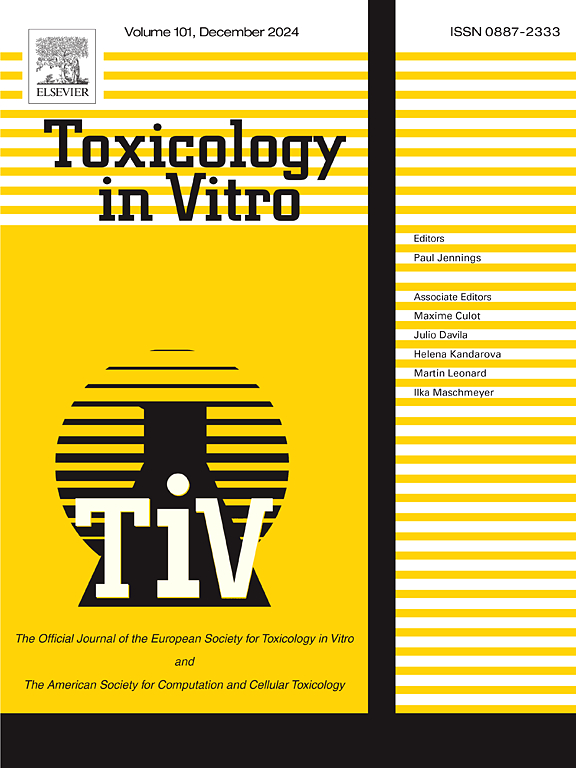Neutrophil extracellular traps formation and autophagy in bongkrekic acid exposed human neutrophils
IF 2.6
3区 医学
Q3 TOXICOLOGY
引用次数: 0
Abstract
Bongkrekic acid (BKA), a less well-known foodborne toxin, has been implicated in numerous poisoning incidents. Recent studies suggest that BKA exerts an impact on the immune system, particularly on innate immunity. The release of neutrophil extracellular traps (NETs) is relatively a newly-discovered mechanism involving innate immunity. This study was designed to characterize and evaluate the effects of BKA on human NET formation. The co-localization of DNA, histones, and myeloperoxidase (MPO) was determined via immunostaining to confirm BKA-triggered NET formation in human neutrophils. NET quantification showed that NET formation induced by BKA was both time- and dose-dependent, and was associated with p38, ERK, PAD4 and P2X1 receptor. Moreover, immunostaining analysis observed that BKA triggered both NET formation and autophagy. Additionally, pharmacological experiments revealed that autophagy mediated BKA-triggered NET formation. Collectively, these insights offer a novel perspective on the effects of BKA exposure on host's innate immune response, and may shed new light on BKA poisoning. We call for further work to be conducted in this field to unravel the intricate mechanisms governing NET formation and autophagy in the context of BKA poisoning.
中性粒细胞胞外陷阱的形成和自噬在暴露于bongkrekic酸的人中性粒细胞。
BKA是一种不太为人所知的食源性毒素,与许多中毒事件有关。最近的研究表明BKA对免疫系统有影响,特别是对先天免疫。中性粒细胞胞外陷阱(NETs)的释放是一种相对较新的涉及先天免疫的机制。本研究旨在描述和评估BKA对人类NET形成的影响。通过免疫染色确定DNA、组蛋白和髓过氧化物酶(MPO)的共定位,以确认bka触发的人中性粒细胞中NET的形成。NET定量分析显示,BKA诱导的NET形成具有时间和剂量依赖性,与p38、ERK、PAD4和P2X1受体相关。此外,免疫染色分析发现BKA同时触发了NET的形成和自噬。此外,药理学实验显示自噬介导bka触发的NET形成。总的来说,这些见解为BKA暴露对宿主先天免疫反应的影响提供了一个新的视角,并可能为BKA中毒提供新的思路。我们呼吁在这一领域开展进一步的工作,以揭示在BKA中毒背景下控制NET形成和自噬的复杂机制。
本文章由计算机程序翻译,如有差异,请以英文原文为准。
求助全文
约1分钟内获得全文
求助全文
来源期刊

Toxicology in Vitro
医学-毒理学
CiteScore
6.50
自引率
3.10%
发文量
181
审稿时长
65 days
期刊介绍:
Toxicology in Vitro publishes original research papers and reviews on the application and use of in vitro systems for assessing or predicting the toxic effects of chemicals and elucidating their mechanisms of action. These in vitro techniques include utilizing cell or tissue cultures, isolated cells, tissue slices, subcellular fractions, transgenic cell cultures, and cells from transgenic organisms, as well as in silico modelling. The Journal will focus on investigations that involve the development and validation of new in vitro methods, e.g. for prediction of toxic effects based on traditional and in silico modelling; on the use of methods in high-throughput toxicology and pharmacology; elucidation of mechanisms of toxic action; the application of genomics, transcriptomics and proteomics in toxicology, as well as on comparative studies that characterise the relationship between in vitro and in vivo findings. The Journal strongly encourages the submission of manuscripts that focus on the development of in vitro methods, their practical applications and regulatory use (e.g. in the areas of food components cosmetics, pharmaceuticals, pesticides, and industrial chemicals). Toxicology in Vitro discourages papers that record reporting on toxicological effects from materials, such as plant extracts or herbal medicines, that have not been chemically characterized.
 求助内容:
求助内容: 应助结果提醒方式:
应助结果提醒方式:


